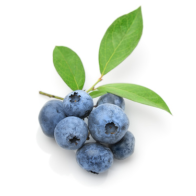Bilberry
 Overview
Overview
The bilberry (or vaccinium myrtillus) has been used for centuries to treat various medical conditions. Also valued as a food for its taste and high nutritional content, this fruit is used fresh or dried. Bilberry is known under several other names, including dwarf bilberry, European bilberry, European blueberries, huckleberry, whortleberry, hurtleberry, blaubeeren, baies de myrtille and petit myrte.
Bilberry has been used to treat hemorrhoids and diarrhea, as this fruit has quite a bit of astringent properties. During World War II pilots of the British Royal Air Force discovered that their night vision was significantly improved if they consumed bilberry or bilberry preserves.
Chemical Components
This fruit contains catechin tannins, fruit acids, pectins, flavonol glycosides, and polyphenols such as anthocyanosides. Bilberry also contains significant amounts of vitamin C and chromium, which are thought to play an important role in its health-giving properties.
Uses
Anthocyanosides, which are condensed tannins, cause astringent reactions, making mucosa less permeable. This quality makes tannins a good choice for treating diarrhea when taken internally, and when applied externally a styptic action occurs which reduces blood loss.
Bilberry is also used as an antioxidant. It is thought that the flavonoid compounds in bilberry are responsible for this particular benefit.
Some of the other uses for bilberry include the following:
- Trigylcerides – A dried extract of the bilberry leaf has been used to decrease plasma triglyceride levels in lab rats. Further studies may show potential for human use.
- Inflammation of the mouth and throat – Because of its astringent and anti-inflammatory properties, bilberry has been approved for use as a topical application for inflammation of the mouth and throat.
- Opthalmic conditions – Bilberry has been used to improve night vision, prevent or retard diabetic retinopathy, cataracts and macular degeneration. These healing effects are thought to be caused by the antioxidant activities and collagen-enhancing properties of the fruit.
- Varicose veins, venous insufficiency and hemorrhoids – Clinical trials support the external use of bilberry for these conditions due to its anti-inflammatory and astringent qualities. The extract of bilberry is thought to help prevent or treat fragile capillaries, which can lead to hemorrhage, heart attacks, stroke, or blindness. Other studies have shown the use of bilberry significantly improves the symptoms resulting from varicose syndrome such as heaviness, cramps and calf and ankle swelling.
- Glaucoma – In one study, a single oral does of bilberry showed noted improvement in glaucoma patients. European studies confirm this outcome, where bilberry extracts have become recognized as highly effective in treating or preventing diabetic retinopathy.
Dosage
Internal dosage of a fluid extract of bilberry is typically 6-12 ml a day taken three times a day. Externally, take 5 to 10 g of the crushed, dried fruit in 150 ml of cold water, brought to a boil for 10 minutes then strained.
Adverse Reactions
Most studies show no adverse effects from patients who used bilberry for health reasons. Insufficient studies have been conducted in pregnant women to make conclusions regarding higher doses.
Reduced absorption of iron is possible if taken at the same time as bilberry. Therefore, separation of doses by two or more hours is recommended.
References
- Bratman, S. The Alternative Medicine Ratings Guide: an expert panel rates the best treatments for over 80 conditions, Prima Health A Division of Prima Publishing (1998)
- Brown, L. Alternative Medicine, NTC/Contemporary Publishing (1999)
- Deepak Chopra, M.D. Alternative Medicine: The Definitive Guide, Celestial Arts (2002)
- Duke, J. The Green Pharmacy: Herbal remedies for common diseases and conditions from the world's foremost authority on healing herbs,Rodale Limited (2003)
- Nancy Allison. The Illustrated Encyclopedia of Body-Mind Disciplines, The Rosen Publishing Group (1999)
- Servan-Schreiber, D. The Encyclopedia of New Medicine: Conventional & Alternative Medicine For All Ages, Rodale International Limited (2006)
Posted in Bilberry
Ask a Question Or Join a Discussion


